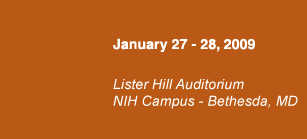DRAFT AGENDA (updated 12-16-08) |
| Day 1 |
Tuesday, January 27, 2009 |
| 7:30 – 8:15 a.m. |
Registration and Continental Breakfast
Lister Hill Auditorium, NIH Campus |
| 8:15 – 8:30 a.m. |
Opening Remarks/Meeting Overview
Judith Fradkin, M.D., National Institute of Diabetes and Digestive and Kidney Diseases |
| 8:30 – 9:15 a.m. |
Keynote 1: Regulating BiP’s Multiple Functions via Interactions With Distinct Sets of Co-factors
Linda Hendershot, Ph.D., St. Jude Children’s Research Hospital |
| 9:15 – 10:00 a.m. |
Keynote 2:
Are There Therapeutic Opportunities in the Unfolded Protein Response?
David Ron, M.D., New York University School of Medicine |
| 10:00 – 10:30 a.m. |
Break |
| |
|
| Session I: |
ER Stress and Mis-folding – Basic Pathways
Moderator: David Ron, M.D. |
| 10:30 – 11:00 a.m. |
Regulation and Mis-regulation of Protein Translocation into the Endoplasmic Reticulum
Ramanujan Hegde, M.D., Ph.D., National Institute of Child Health and Human Development |
| 11:00 – 11:30 a.m. |
Mechanisms of Membrane Protein Folding in the Endoplasmic Reticulum
William Skach, M.D., Oregon Health & Science University |
| 11:30 a.m. – 12:00 p.m. |
The Selection of the Heterotrimeric Epithelial Sodium Channel (ENaC) for ER Associated Degradation (ERAD)
Teresa Buck, Ph.D., University of Pittsburgh |
| 12:00 – 12:15 p.m. |
Hot Topic: Visualizing Misfolded Protein Stress in the ER of Live Cells
Erik Snapp, Ph.D., Albert Einstein College of Medicine |
| 12:15 – 2:15 p.m. |
Lunch Buffet and Poster Session I |
| |
|
| Session II: |
ER Stress and Mis-folding in Disease – Novel Outcomes
Moderator: David Perlmutter, M.D. |
| 2:15 – 2:45 p.m. |
Proteostasis
Jeff Kelly, Ph.D., The Scripps Research Institute |
| 2:45 – 3:15 p.m. |
Accumulation of an Aggregation-Prone Mutant Protein in the Endoplasmic Reticulum Causes Liver Disease in α1Antitrypsin Deficiency: The Role of Autophagy and Other Intracellular Disposal Pathways
David Perlmutter, M.D., University of Pittsburgh School of Medicine |
| 3:15 – 3:30 p.m. |
Hot Topic: Investigating the Role of YBR074W in ER Quality Control
Karen Hecht, Ph.D., University of Pittsburgh |
| 3:30 – 4:00 p.m. |
Break |
| 4:00 – 4:30 p.m. |
Integrating Metabolism and the Unfolded Protein Response
Gokhan Hotamisligil, M.D., Ph.D., Harvard University School of Public Health |
| 4:30 – 5:00 p.m. |
Molecular Origami: Protein Folding and Misfolding in Health and Disease
Judith Frydman, Ph.D., Stanford University |
| 5:00 – 5:30 p.m. |
Sulfonylureas as Chemical Chaperones for KATP Channels: Old Drugs with a New Purpose
Show-Ling Shyng, Ph.D., Oregon Health & Science University |
| 5:30 – 5:45 p.m. |
Hot Topic: Negative Regulation of ER Stress Signaling Through WFS1-mediated ATF6 Proteolysis
Sonya G. Fonseca, University of Massachusetts Medical School |
| 5:45 p.m. |
Adjourn |
| |
|
| Day 2 |
Wednesday, January 28, 2009 |
| 7:30 – 8:00 a.m. |
Registration and Continental Breakfast
Lister Hill Auditorium, NIH Campus |
| |
|
| Session III: |
Translating Basic Findings From Mis-folding Diseases
Moderator: Alan Verkman, M.D., Ph.D. |
| 8:00 – 8:30 a.m. |
Proteostatic Pathways Regulating Correction of Cystic Fibrosis
William Balch, Ph.D., The Scripps Research Institute |
| 8:30 – 9:00 a.m. |
ERAD Inhibitors Integrate ER Stress With an Epigenetic Mechanism to Activate BH3 Only Protein NOXA in Cancer Cells
Yihong Ye, Ph.D., National Institute of Diabetes and Digestive and Kidney Diseases |
| 9:00 – 9:30 a.m. |
Insights into the Ubiquitin-Proteasome System from Studies on Endoplasmic Reticulum-associated Degradation
Alan Weissman, M.D., National Cancer Institute at Frederick |
| 9:30 – 9:50 a.m. |
NIH Funding Opportunities—Molecular Libraries Roadmap Initiatives
Mark Scheideler, Ph.D., National Institute of Neurological Disorders and Stroke |
| 9:50 – 10:20 a.m. |
Break |
| 10:20 – 10:50 a.m. |
High Throughput Screening – CFTR and Aquaporins
Alan Verkman, M.D., Ph.D., University of California at San Francisco |
| 10:50 – 11:20 a.m. |
Autosomal Dominant Familial Isolated Hypoparathyroidism: A Protein Folding Endocrinopathy Potentially Treatable With Chemical Chaperones
William Sly, M.D., St. Louis University, School of Medicine |
| 11:20 – 11:35 a.m. |
Hot Topic: SHSPS Targets ΔF508 CFTR for ERAD via SUMO-dependent Ubiquitin-independent Pathway
Annette Ahner, Ph.D., University of Pittsburgh |
| 11:35 – 1:30 p.m. |
Lunch Buffet and Poster Session II |
| |
|
| Session IV: |
High-Throughput Screening for Protein Folding and Processing
Moderator: Jeff Kelly, Ph.D. |
| 1:30 – 1:45 p.m. |
Small Molecule Activator for Enzyme Deficiency in Aspartylglucosaminuria
Hwai-Chen Guo, Ph.D., Boston University School of Medicine |
| 1:45 – 2:00 p.m. |
PDZ Proteins as Therapeutic Targets for CF: A CAL-Selective Inhibitor Increases Functional Levels of ΔF508-CFTR
Dean Madden, Ph.D., Dartmouth Medical School |
| 2:00 – 2:15 p.m. |
Yeast Cell-based Reporters for Protein Misfolding
Chandra Tucker, Ph.D., Duke University |
| 2:15 – 2:30 p.m. |
Small Molecule Inhibitors of Immunoglobulin Light Chain Fibrillogenesis
Brian O’Nuallain, Ph.D., University of Tennessee Medical Center |
| 2:30 – 2:45 p.m. |
Niemann-Pick C Disease: Small Molecule Chaperones, With a Twist
Yiannis Ioannou, Ph.D., The Mount Sinai School of Medicine |
| 2:45 – 3:15 p.m. |
Break |
| 3:15 – 3:30 p.m. |
Quality Control of Non-native CFTR at the Cell Surface
Gergely L. Lukacs, M.D., Ph.D., Hospital for Sick Children Research Institute |
| 3:30 – 3:45 p.m. |
Protein Misprocessing in Krabbe Disease
Christopher B. Eckman, Ph.D., Mayo Clinic |
| 3:45 – 4:00 p.m. |
Development of a C. elegans Model of a1-Antitrypsin Deficiency Amenable to High-content Screening
Gary A. Silverman, M.D., Ph.D., Mcgee Women’s Hospital
|
| 4:00 – 4:30 p.m. |
Panel Discussion
Drs. Kelly, Verkman, Ron, Perlmutter and Shyng |
| 4:30 p.m. |
Adjourn |










